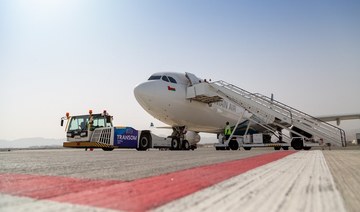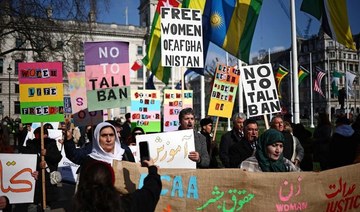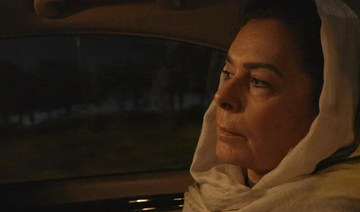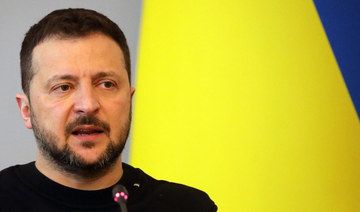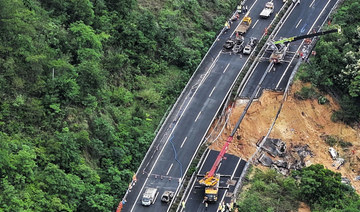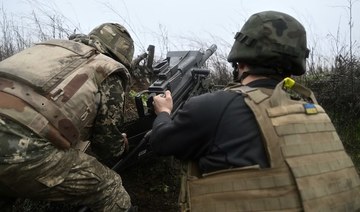DAR ES SALAAM: Samia Suluhu Hassan made history Friday when she was sworn in as Tanzania’s first female president after the death of her controversial predecessor, John Magufuli, who denied that COVID-19 is a problem in the East African country.
Wearing a hijab and holding up a Quran with her right hand, the 61-year-old Hassan took the oath of office at State House, the government offices in Dar es Salaam, the country’s largest city.
The inauguration was witnessed by Cabinet members, former presidents Ali Hassan Mwinyi and Jakaya Kikwete. The former heads of state were among the few people in the room wearing face masks to protect against COVID-19.
Hassan succeeds Magufuli, who had not been seen in public for more than two weeks before his passing was announced on state TV late Wednesday. Magufuli had denied that COVID-19 was a problem in Tanzania, saying that national prayer had eradicated the disease from the country. But Magufuli acknowledged weeks before his death that the virus was a danger.
A major test of Hassan’s new presidency will be how she deals with the pandemic. Under Magufuli, Tanzania, one of Africa’s most populous countries with 60 million people, made no efforts to obtain vaccines or promote the use of masks and social distancing to combat the virus. This policy of ignoring the disease endangers neighboring countries, African health officials warn.
Although Hassan announced that Magufuli died of heart failure, exiled opposition leader Tundu Lissu says the president died of COVID-19, citing informed medical sources in Dar es Salaam.
“The immediate job, the immediate decision she has to make, and she doesn’t have much time for it, is what is she going to do about COVID-19?" Lissu told The Associated Press at his place of exile in Belgium.
“President Magufuli defied the world, defied science, defied common sense in his approach to COVID-19 and it finally brought him down,” said Lissu.
"President Samia Saluhu Hassan has to decide very soon whether she is changing course or continuing with the same disastrous approach to COVID-19 that her predecessor took,“ the opposition leader said.
Hassan must also decide how she will address Magufuli’s legacy, including whether to continue with his policies that took Tanzania from a relatively tolerant democracy to a repressive state, Lissu said, questioning if she will be able to restore the country's political freedoms and democracy.
Lissu went into exile in 2017 after he was shot 16 times. The attack came shortly after Magufuli said those who were opposed to his economic reforms deserved to die. Lissu returned to Tanzania to challenge Magufuli in the 2020 elections. He lost to Magufuli in polls marred by violence and widespread allegations of vote-rigging. Lissu returned to exile, saying his life was in danger.
Speaking at her inauguration, Hassan gave little indication that she intended to change course from Magufuli.
“It's not a good day for me to talk to you because I have a wound in my heart," said Hassan, speaking Kiswahili. "Today I have taken an oath different from the rest that I have taken in my career. Those were taken in happiness. Today I took the highest oath of office in mourning,” she said.
She said that Magufuli, “who always liked teaching,” had prepared her for the task ahead. “Nothing shall go wrong,” she assured, urging unity.
“This is the time to stand together and get connected. It’s time to bury our differences, show love to one another and look forward with confidence," she said. "It is not the time to point fingers at each other but to hold hands and move forward to build the new Tanzania that President Magufuli aspired to.”
Hassan will complete Magufuli's second term that began in October. She has had a meteoric rise in politics in a male-dominated field. Both Tanzania and the surrounding East African region are slowly emerging from patriarchy.
After Magufuli selected her as his running mate in 2015, Hassan became Tanzania's first female vice president. She was the second woman to become vice president in the region, after Uganda’s Specioza Naigaga Wandira who was in office from 1994 to 2003.
Born in Zanzibar, Tanzania’s semi-autonomous archipelago, in 1960, Hassan went to primary school and secondary school at a time when very few girls in Tanzania were getting educations as parents thought a woman’s place was that of wife and homemaker.
After graduating from secondary school in 1977, Hassan studied statistics and started working for the government, in the Ministry of Planning and Development. She worked for a World Food Program project in Tanzania in 1992 and then attended the University of Manchester in London to earn a postgraduate diploma in economics. In 2005, she earned a master’s degree in community economic development through a joint program between the Open University of Tanzania and Southern New Hampshire University in the U.S.
Hassan went into politics in 2000 when she became a member of the Zanzibar House of Representatives. In 2010, she won the Makunduchi parliamentary seat with more than 80% percent of the vote. She was appointed a Cabinet minister in 2014 and became vice-chairperson of the Constituent Assembly that drafted a new constitution for Tanzania, a role in which she won respect for deftly handling several challenges.
As president, Hassan's first task will be to unite the ruling Chama Cha Mapinduzi party behind her, said Ed Hobey-Hamsher, senior Africa analyst with the Verisk Maplecroft research firm. The party has been in power since Tanzania's independence.
As a Muslim woman from Zanzibar, Hassan may find it difficult to win the support of the party's mainland Christians, he said, warning that some entrenched leaders may develop “obstructionist strategies” against her. He said it's likely that Hassan will start her rule by maintaining the status quo and not embarking on a significant Cabinet reshuffle.
Hassan is the second woman in East Africa to serve as head of state. Burundi’s Sylvia Kiningi served as interim president of that tiny landlocked country for nearly four months until Feb. 1994.
___
Odula contributed from Nakuru, Kenya. AP journalist Bishr Eltouni in Tienen, Belgium, contributed.
Samia Suluhu Hassan becomes Tanzania’s first woman president
https://arab.news/8jg5f
Samia Suluhu Hassan becomes Tanzania’s first woman president

- Wearing a hijab and holding up a Quran with her right hand, the 61-year-old Hassan took the oath of office at State House
- Hassan succeeds Magufuli, who had not been seen in public for more than two weeks before his passing was announced on state TV late Wednesday
A British-Palestinian doctor was denied entry to France for a Senate meeting about the war in Gaza
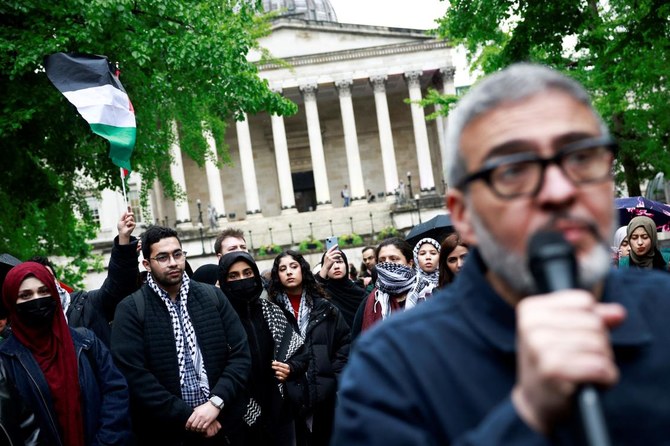
Abu Sitta posted on social networks that he was denied entry in France because of a one-year ban by Germany on his entry to Europe
PARIS: A well-known British-Palestinian surgeon who volunteered in Gaza hospitals said he was denied entry to France on Saturday to speak at a French Senate meeting about the Israel-Hamas war. Authorities wouldn’t give a reason for the decision.
Dr. Ghassan Abu Sitta was placed in a holding zone in the Charles de Gaulle airport and will be expelled, according to French Sen. Raymonde Poncet Monge, who had invited him to speak at the Senate.
‘’It’s a disgrace,’’ she posted on X.
Abu Sitta posted on social networks that he was denied entry in France because of a one-year ban by Germany on his entry to Europe. Germany denied him entry last month, and France and Germany are part of Europe’s border-free Schengen zone. He posted Saturday that he was being sent back to London.
The French Foreign Ministry, Interior Ministry, local police and the Paris airport authority would not comment on what happened or give an explanation.
Abu Sitta had been invited by France’s left-wing Ecologists group in the Senate to speak at a colloquium Saturday about the situation in Gaza, according to the Senate press service. The gathering included testimony from medics, journalists and international legal experts with Gaza-related experience.
Last month Abu Sitta was denied entry to Germany to take part in a pro-Palestinian conference. He said he was stopped at passport control, held for several hours and then told he had to return to the UK He said airport police told him he was refused entry due to “the safety of the people at the conference and public order.”
Abu Sitta, who recently volunteered with Doctors Without Borders in Gaza, has worked during multiple conflicts in the Palestinian territories, beginning in the late 1980s during the first Palestinian uprising. He has also worked in other conflict zones, including in Iraq, Syria and Yemen.
France has seen tensions related to the Mideast conflict almost daily since the deadly Oct. 7 Hamas incursion into Israel. In recent days and weeks police have cleared out students at French campuses holding demonstrations and sit-ins similar to those in the United States.
Afghanistan’s only female diplomat resigns in India after gold smuggling allegations
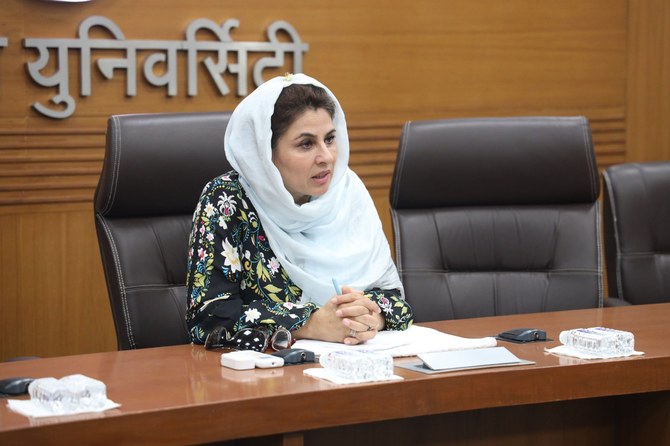
- Zakia Wardak, the Afghan consul-general for Mumbai, announced her resignation on her official account on the social media platform X
- According to Indian media reports, she has not been arrested because of her diplomatic immunity
ISLAMABAD: Afghanistan’s diplomat in India, who was appointed before the Taliban seized power in 2021 and said she was the only woman in the country’s diplomatic service, has resigned after reports emerged of her being detained for allegedly smuggling gold.
Zakia Wardak, the Afghan consul-general for Mumbai, announced her resignation on her official account on the social media platform X on Saturday after Indian media reported last week that she was briefly detained at the city’s airport on allegations of smuggling 25 bricks of gold, each weighing 1 kilogram (2.2 pounds), from Dubai.
According to Indian media reports, she has not been arrested because of her diplomatic immunity.
In a statement, Wardak made no mention of her reported detention or gold smuggling allegations but said, “I am deeply sorry that as the only woman present in Afghanistan’s diplomatic apparatus, instead of receiving constructive support to maintain this position, I faced waves of organized attacks aimed at destroying me.”
“Over the past year, I have encountered numerous personal attacks and defamation not only directed toward myself but also toward her close family and extended relatives,” she added.
Wardak said the attacks have “severely impacted my ability to effectively operate in my role and have demonstrated the challenges faced by women in Afghan society.”
The Taliban Foreign Ministry did not immediately return calls for comment on Wardak’s resignation. It wasn’t immediately possible to confirm whether she was the country’s only female diplomat.
She was appointed consul-general of Afghanistan in Mumbai during the former government and was the first Afghan female diplomat to collaborate with the Taliban.
The Taliban — who took over Afghanistan in 2021 during the final weeks of US and NATO withdrawal from the country — have barred women from most areas of public life and stopped girls from going to school beyond the sixth grade as part of harsh measures they imposed despite initial promises of a more moderate rule.
They are also restricting women’s access to work, travel and health care if they are unmarried or don’t have a male guardian, and arresting those who don’t comply with the Taliban’s interpretation of hijab, or Islamic headscarf.
Russia puts Ukraine's Zelensky on wanted list, TASS reports
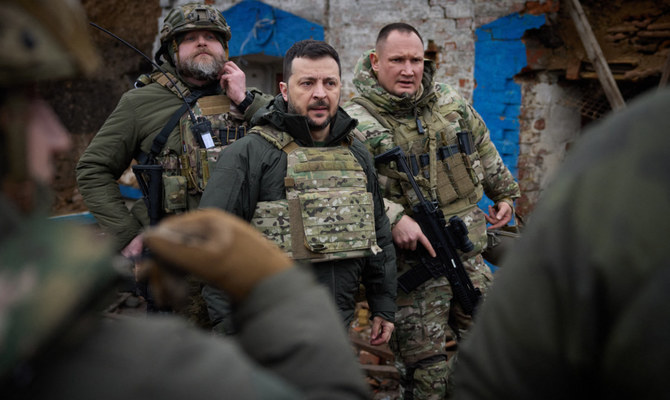
- Russia has issued arrest warrants for a number of Ukrainian and other European politicians
MOSCOW: Russia has opened a criminal case against Ukrainian President Volodymyr Zelensky and put him on a wanted list, the state news agency TASS reported on Saturday, citing the Interior Ministry's database.
The entry it cited gave no further details.
Russia has issued arrest warrants for a number of Ukrainian and other European politicians since the start of the conflict with Ukraine in February 2022.
Russian police in February put Estonian Prime Minister Kaja Kallas, Lithuania's culture minister and members of the previous Latvian parliament on a wanted list for destroying Soviet-era monuments.
Russia also issued an arrest warrant for the International Criminal Court (ICC) prosecutor who last year prepared a warrant for President Vladimir Putin on war crimes charges.
A Chinese driver is praised for helping reduce casualties in a highway collapse that killed 48
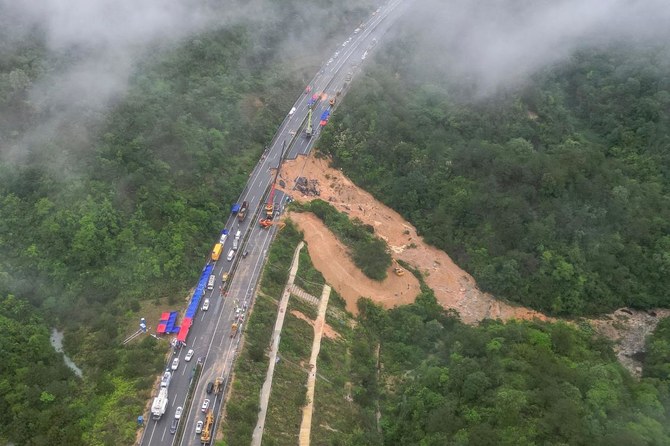
- Reacting swiftly, Wang, a former soldier, positioned his truck to block the highway, effectively stopping dozens of vehicles from advancing into danger
- His wife got out of the truck to alert other drivers about the situation
BEIJING: A Chinese truck driver was praised in local media Saturday for parking his vehicle across a highway and preventing more cars from tumbling down a slope after a section of the road in the country’s mountainous south collapsed and killed at least 48 people.
Wang Xiangnan was driving Wednesday along the highway in Guangdong province, a vital economic hub in southern China. At around 2 a.m., Wang saw several vehicles moving in the opposite direction of the four-lane highway and a fellow driver soon informed him about the collapse, local media reported.
Reacting swiftly, Wang, a former soldier, positioned his truck to block the highway, effectively stopping dozens of vehicles from advancing into danger, Jiupai News quoted Wang as saying. Meanwhile, his wife got out of the truck to alert other drivers about the situation, it said.
“I didn’t think too much. I just wanted to stop the vehicles,” Wang told the Chinese news outlet.
Wang’s courageous actions not only garnered praise from Chinese social media users but also recognition from the China Worker Development Foundation.
The foundation announced Friday that in partnership with a car company it had awarded Wang 10,000 yuan ($1,414). A charity project linked to tech giant Alibaba Group Holding also gave an equal amount to Wang, newspaper Dahe Daily reported. Wang told the newspaper he would donate the money to the families of the collapse victims.
Local media also reported that another man had knelt down to prevent cars from proceeding on the highway.
The accident came after a month of heavy rains in Guangdong. Some of the 23 vehicles that plunged into the deep ravine burst in flames, sending up thick clouds of smoke.
About 30 people were hospitalized. On Saturday, one was discharged from the hospital, state broadcaster CCTV reported. The others were improving, but one remains in serious condition.
On Saturday, the Meizhou city government in Guangdong said in a statement that authorities would conduct citywide checks on expressways, railways and roads in mountainous areas. A team led by the provincial governor is investigating the cause of the collapse, Southcn.com reported.
The Chinese government had sent a vice premier to oversee recovery efforts and urged better safety measures following calls by President Xi Jinping and the Communist Party’s No. 2 official, Premier Li Qiang, to swiftly handle the tragedy.
The dispatch of Zhang Guoqing, who is also a member of one of the ruling Communist Party’s leading bodies, illustrates the concern over a possible public backlash over the disaster, the latest in a series of deadly infrastructure failures.
Russia says it shot down four US-made long range missiles over Crimea

- The ATACMS missiles, with a range up to 300km were used for the first time in the early hours of April 17
MOSCOW: The Russian defense ministry said on Saturday its air defense forces shot down four US-produced long-range missiles over the Crimea peninsular, weapons known as Army Tactical Missile Systems (ATACMS) that Washington has shipped to Ukraine in recent weeks.
The ministry said later that Russian aircraft and air defense systems had downed a total of 15 ATACMS in the past week.
On Tuesday, Russian officials said Ukraine had attacked Crimea with ATACMS in an attempt to pierce Russian air defenses of the annexed peninsula but that six had been shot down.
A US official said in Washington last month that the United States secretly shipped long-range missiles to Ukraine in recent weeks.
The ATACMS missiles, with a range up to 300km were used for the first time in the early hours of April 17, launched against a Russian airfield in Crimea that was about 165 km (103 miles) from the Ukrainian front lines, the official said.
The Pentagon initially opposed the long-range missile deployment, concerned that taking the missiles from the American stockpile would hurt US military readiness.
There were also concerns that Ukraine would use them to attack targets deep inside Russia, a step which could lead to an escalation of the war toward a direct confrontation between Russia and the United States.
Separately on Saturday, the Russian defense ministry said that in the last week its forces had destroyed a military train carrying equipment and arms produced in the West and supplied to Ukraine by NATO.
The scale of the damage, exact date and location were not disclosed.
Reuters is not immediately able to corroborate battlefield accounts from either side.
On Thursday, British Foreign Secretary David Cameron promised 3 billion pounds ($3.7 billion) of annual military aid for Ukraine for “as long as it takes,” adding that London had no objection to its weapons being used inside Russia, drawing a strong rebuke from Moscow.







